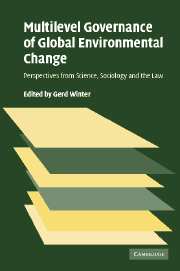 Multilevel Governance of Global Environmental Change
Multilevel Governance of Global Environmental Change Book contents
- Frontmatter
- PREFACE
- Contents
- List of figures
- List of tables
- Notes on contributors
- List of abbreviations
- 1 Introduction
- PART I Earth system analysis
- PART II Society and institutions of global; environmental change
- PART III Self-regulation of industry and the law
- PART IV The potential of the state
- PART V The potential of world regions
- PART VI Formation and implementation of international regimes
- 15 Multilateral environmental agreements and the compliance continuum
- 16 On clustering international environmental agreements
- 17 Institutions, knowledge, and change: findings from the quantitative study of environmental regimes
- PART VII Improving the instruments of global governance
- PART VIII Fundamental concepts of institutionalising common concern
- Index
17 - Institutions, knowledge, and change: findings from the quantitative study of environmental regimes
Published online by Cambridge University Press: 04 May 2010
- Frontmatter
- PREFACE
- Contents
- List of figures
- List of tables
- Notes on contributors
- List of abbreviations
- 1 Introduction
- PART I Earth system analysis
- PART II Society and institutions of global; environmental change
- PART III Self-regulation of industry and the law
- PART IV The potential of the state
- PART V The potential of world regions
- PART VI Formation and implementation of international regimes
- 15 Multilateral environmental agreements and the compliance continuum
- 16 On clustering international environmental agreements
- 17 Institutions, knowledge, and change: findings from the quantitative study of environmental regimes
- PART VII Improving the instruments of global governance
- PART VIII Fundamental concepts of institutionalising common concern
- Index
Summary
Introduction
States create international institutions with the aim of facilitating the exchange of data, coordinating and strengthening scientific monitoring and national research efforts, and aiding the implementation of international research programmes. Examples of such goals are seen in various Articles of the 1979 ECE Convention on Long-Range Transboundary Air Pollution in Europe. These provide that member states ‘shall by means of exchange of information, consultation, research and monitoring, develop … policies and strategies which shall serve as a means for combating the discharge of air pollutants’ (Article 3), or that member states should ‘exchange information on and review their policies, scientific activities and technical measures’ (Article 4). Similar provisions are included in many other international framework conventions. The role of international institutions as arenas which contribute to changing the cognitive foundations of governance beyond the nation state has been one of the central topics addressed by the study of regime effectiveness. Regime analysts have paid special attention to exploring the role of the institutional design in the evolution of consensual knowledge. This impact of institutions has mainly been studied in individual regimes – comparative or quantitative studies remain absent. In the following chapter, an effort will be made to explore the impact of international regimes on those components of consensual knowledge relevant to policy-making in transboundary environmental issue areas. Empirical measurements are based on data collected for the International Regimes Database (IRD).
- Type
- Chapter
- Information
- Multilevel Governance of Global Environmental ChangePerspectives from Science, Sociology and the Law, pp. 430 - 452Publisher: Cambridge University PressPrint publication year: 2006
- 2
- Cited by


